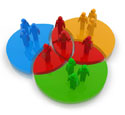Comparison of Three Evidence-Based Practices to Reduce Substance Use
 In a recent article in our Primary Sources column, we looked at a study of three therapies that have been used for years by mental health professionals to help people with drug abuse problems. In the study, all three therapies helped runaway and homeless youth and their families communicate better and improved their mental health. But there are differences in how they are delivered and what outcomes they target. We put together a comparison to help runaway and homeless youth workers decide if one or more of these approaches might be right for their programs:
In a recent article in our Primary Sources column, we looked at a study of three therapies that have been used for years by mental health professionals to help people with drug abuse problems. In the study, all three therapies helped runaway and homeless youth and their families communicate better and improved their mental health. But there are differences in how they are delivered and what outcomes they target. We put together a comparison to help runaway and homeless youth workers decide if one or more of these approaches might be right for their programs:
| Therapy | Motivational Interviewing | Ecologically-Based Family Therapy | Community Reinforcement Approach |
|---|---|---|---|
| Approach | A therapist tries to create conditions that will motivate patients and help them become committed to changing their lives. A shorter version, called brief motivational interviewing, has been found to be just as effective as the original. Some people think the brief version is a better fit for highly mobile homeless youth. | This type of therapy helps runaway teens with drug problems and their families communicate better. Together, the therapist, youth and family address immediate needs, resolve the crisis of running away and try to reconnect emotionally. | The community reinforcement approach aims to replace drug and alcohol use with healthy behaviors. The version for teens, called adolescent community reinforcement, was adapted for a drop-in center for street youth. |
| Goal | Less drinking and drug use and more follow-through in treatment | Less drinking and drug use; better family relationships and reunification; prevention of HIV | Less drinking and drug use |
| How it works |
Therapists using this approach are supposed to
|
The therapy takes into account the individual, interpersonal, and environmental context as well as the strengths and needs of the family and its members. Techniques include:
|
For the adolescent version of this approach, therapists choose from 19 procedures that address, for example:
|
| Who it's for | 18- to 25- year-olds | 12- to 17-year-olds | 13- to 25-year-olds |
| How long it lasts | Motivational interviewing varies in length. The brief version can last one to five sessions. | Includes 12 family therapy sessions at home or in an office, and two to four individual HIV-prevention sessions, lasting 50 minutes each, over a period of three to six months (including follow-up after youth return home). | Varies. Shown to be effective in inpatient, outpatient, home, and community settings. |
| Pros | This highly replicable treatment has a lot of research behind it and can be done in a brief period of time. | This therapy was designed for working with runaway youth. | This therapy was adapted for drop-in centers for street youth. |
| Cons | Motivational interviewing may work best when therapists have professional training in it. In addition, this approach only addresses the young person’s self-motivation, and not family or community problems that may compound their addictions. | The length of this program may make it better for long-term programs than for, say, emergency shelters. Providers need excellent skills in managing family crisis and youths’ risks. And while the therapy targets family, it doesn’t directly address a youth’s behavior and motivation. | This therapy works best when participants have the means and motivation to complete homework assignments, and when the organization is able to help youth youth remove themselves from negative environments. |


 Sign up
Sign up Follow us
Follow us Like us
Like us Sign up for our RSS feeds:
Sign up for our RSS feeds: 

